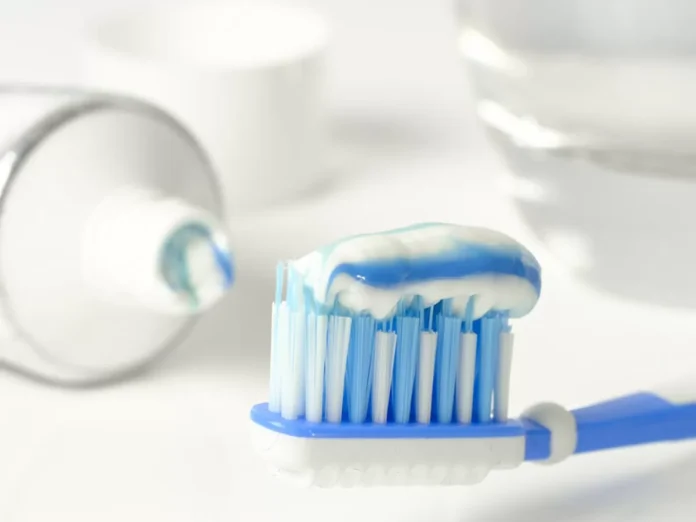Sodium Lauryl Sulfate (SLS), a detergent and surfactant commonly found in personal care and cleaning products, is known for its cleansing and foaming properties. While many people assume that all toothpaste is safe, it’s essential to reconsider this belief. SLS, a common ingredient in numerous toothpaste brands, could potentially be doing more harm than good.
Dr. Janine Bowring, a naturopathic doctor, recently raised concerns about SLS in toothpaste. On her Instagram page, she shared a video urging people to pay attention to the ingredients in their oral care products. “Never use a toothpaste that contains this,” she cautioned, advising viewers to check their toothpaste labels for SLS.
SLS is often added to toothpaste to create a foaming effect, giving users the sensation of a thorough clean. However, research suggests that SLS may have adverse effects on oral health. Studies have linked SLS to oral mucosal irritation, including the development of mouth ulcers and canker sores. Additionally, SLS can strip away the protective layer of saliva in the mouth, leading to dryness and potential damage to oral tissues.
Furthermore, some individuals may be more sensitive to SLS than others. Those with existing oral conditions such as gingivitis or sensitive gums may experience heightened discomfort or irritation when using toothpaste containing SLS. For individuals with a history of allergies or skin sensitivities, SLS in toothpaste could exacerbate these issues.
Given the potential risks associated with SLS, consumers are advised to be mindful of the ingredients in their toothpaste and opt for alternatives that do not contain this compound. Fortunately, there are many SLS-free toothpaste options available on the market, catering to individuals seeking a safer and gentler oral care regimen.
In addition to avoiding toothpaste with SLS, maintaining good oral hygiene practices is essential for overall dental health. This includes brushing teeth twice a day with fluoride toothpaste, flossing daily, and scheduling regular dental check-ups.
Concerns about the potential health effects of SLS extend beyond oral care products. This compound is also commonly found in shampoos, body washes, and other personal care items. Its widespread use in such products has prompted consumer advocacy groups and health professionals to call for stricter regulations and increased transparency regarding ingredient labeling.
While SLS is generally recognized as safe by regulatory agencies such as the Food and Drug Administration (FDA), some experts argue that its potential risks warrant further investigation. Research into the long-term effects of SLS exposure, particularly in oral care products, is ongoing. However, many consumers are choosing to err on the side of caution by seeking out SLS-free alternatives.
Fortunately, the market offers a variety of toothpaste options that are free from SLS and other potentially harmful ingredients. Natural and organic toothpaste formulations, often made with botanical extracts and essential oils, provide effective cleaning without the use of synthetic detergents like SLS. These products are gaining popularity among consumers who prioritize safety and sustainability in their personal care routines.
In addition to avoiding SLS, some individuals may opt for toothpaste alternatives such as baking soda or fluoride-free formulations. Baking soda, known for its mild abrasive properties, can help remove surface stains and neutralize acids in the mouth without the use of harsh chemicals. However, it’s essential to consult with a dentist before making significant changes to your oral care routine to ensure that your dental needs are adequately addressed.
Educating oneself about the potential risks associated with common household ingredients like SLS is an essential step in making informed consumer choices. By reading product labels and staying informed about emerging research, individuals can take proactive measures to minimize their exposure to potentially harmful substances.
In addition to avoiding SLS-containing toothpaste, individuals can explore other natural and eco-friendly oral care practices. These may include oil pulling, a traditional Ayurvedic technique that involves swishing oil in the mouth to remove bacteria and promote oral health. While scientific evidence supporting the efficacy of oil pulling is limited, many people find it to be a refreshing and holistic addition to their oral care routine.
Ultimately, the decision to switch to an SLS-free toothpaste or explore alternative oral care practices is a personal one. However, by prioritizing safety and wellness, individuals can take control of their oral health and contribute to a healthier environment for themselves and future generations.
As consumer awareness grows and demand for safer, more sustainable products increases, manufacturers are responding by developing innovative solutions that prioritize health and environmental stewardship. By supporting companies that prioritize transparency and ingredient integrity, consumers can drive positive change in the personal care industry and promote a culture of wellness and responsibility.

